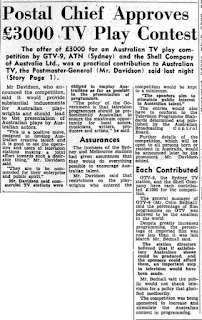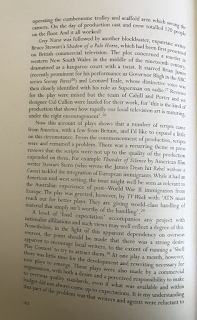In Feb 1959 Ray Menmuir was attached.
Brian Wright told Susan Lever:
I always had a dream, of course, of moving “Shell Presents” from these overseas plays that we were doing. We bought plays from England and America that had already been put on in television over there. But it was our dream to do Australian plays.
But I had to get Australian plays. There were no writers earning a living from television. Dick was probably about the only one. Dick Lane. And we commissioned plays. We did a play called “They Were Big, They Were Blue, They Were Beautiful.” And I’m ashamed I can’t remember the name of the writer. I know who it was, I can’t remember his name. That was a comedy starring Kevin Brennan, the actor. And we did the first musical ever written for Australian television: “Pardon Miss Wescott”. We commissioned that.
After “Johnny Belinda,” I had the dream of doing “Peter Pan” as a ballet starring Cathy Gorham. That was actually my dream. But of course, Cyril Richard had bought “Peter Pan” for television in America, and I couldn’t get the rights. ..
Can I ask how much you were influenced by what was happening in Britain and America? Were you in touch with things there? Were you learning from them?
A1 Well, yes we were. Some of our staff had been trained in England and America. David Carl had been at work for the BBC. He worked as Floor Manager for the BBC. So they knew a bit about television over there. Had some experience. Then GTV, there were several of them who had experience.
We knew a fair bit of what was happening, and I was buying plays from England and America, so I knew a bit about the scene at that stage. But we had no pool of Australian writers on which to draw. A lot of writers were sort of scorning television. They couldn’t sort of get out of the radio side of it. It took a little bit of time to get them into it.
Q And did you work on that? Did you try? I mean, you obviously knew Richard Lane, and included him in this.
A1 Well, yes I worked on it. It is very hard to be specific. We were working, 15-16 hours a day, 7 days a week. We were flat out in those days. In point of fact, Mary--we were living at Newport. And I was working so hard that going home one night, I happened to end up off the road against a tree in the car. So Mary insisted we move, didn’t you.
A2 That was enough. We moved.
A1 We had to move a little closer to the station.
A2 Closer to the city, yeah.
A1 So to say: What did I do? Yes, I called conferences of writers. They scorned the amount of money. Those who were making money as novelists and journalists scorned the amount of money we could pay for them. We actually forced the ABC to put their fees up a little bit because I offered a bit more money for an Australian script than they were paying. That was during “Shell Presents.” We did what-- this was before the Guild. And everything was, well I say the ground was untilled at that stage.
Brett Porter at Vincent Committee
Mr. Oswin, the General Manager of ATN, when giving evidence some years ago said, if I remember correctly, that ATN was receiving approximately £3,500 from the Shell Company for each of its one-hour plays. However, it is well known that, normally speaking, for a one-hour imported film pro- gramme-—one episode of it—the current figure would be approximately £1,000. That is what has to be paid; so that the Shell Company, according to those figures, was paying at least three times what it would normally have had to pay. So, the lowness of this final figure obviously conditions the remuneration of everybody in the business, including myself, the writers and the actors.
By Senator Hannan.—Does that type of gesture made yy the Shell Company happen very often in the industry?
—Unfortunately, very rarely. I can think of the Shell Company and also of General Motors. In both cases, I hink the companies wished to identify themselves as Australian companies and were anxious therefore to be een promoting Australian productions.
It is pretty rare, then?
—It has been very rare, partly, suggest, because of the cost. I spoke of the availability >f writers. I do not mean to suggest that there is a vast array of first quality writers, but there are enough. A great proportion of our radio writers are unused in tele- ision and radio production, despite the fact that they ave enormous skill.
 |
TV Times 5 Feb 1960
|
 |
| NAA Neil HutchisonNAA Neil HutchisonNAA Neil HutchisonNAA Neil Hutchison |
|
 |
NLA Throssell
|
 |
NLA Throssell
|






























No comments:
Post a Comment